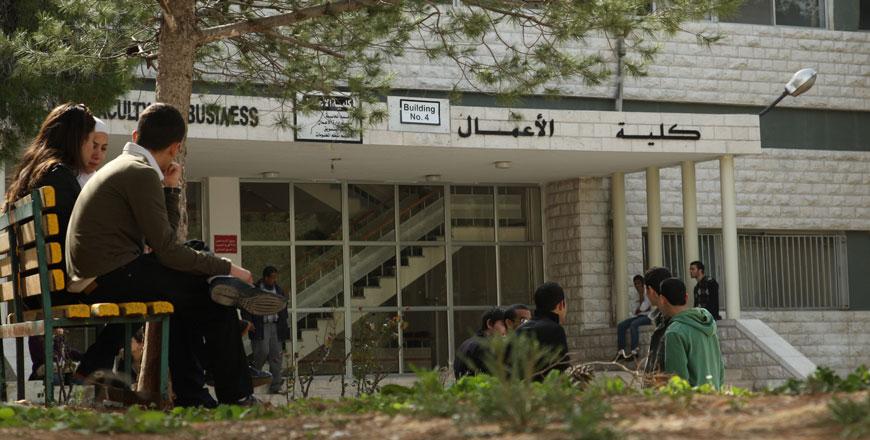You are here
‘Raising university admission rate not enough to reform higher education’
By Khetam Malkawi - Jul 11,2015 - Last updated at Jul 11,2015

Academics say the higher education sector is in need of a comprehensive overhaul, noting that raising the minimum rate for university admission alone is not enough (Photo courtesy of University of Jordan)
AMMAN — Raising the minimum rate for university admission will not contribute to higher education reform, unless it is combined with other reforms in the entire system, according to education experts.
In separate interviews with The Jordan Times, academics said if this move is considered as a step towards higher education reform, it should be preceded by other measures and be based on a comprehensive study showing its impact on Jordanian students.
Last month, the Higher Education Council decided to raise the minimum score for admission to public universities from 65 to 70 and at private universities from 60 to 65, starting with the 2015-2016 academic year.
But activists and lawmakers objected to the decision, prompting the government to refer the new admission criteria to the council for further examination.
For University of Jordan (UJ) President Ekhleif Tarawneh, raising the admission rate should be implemented as part of a strategy and an alternative should be available for students who will not be accepted in universities as a result.
Tarawneh noted that a technical education alternative should be in place first, and the admission rate can be raised afterwards.
The UJ president also suggested scrapping some “humanitarian” majors at university whose graduates have no chance of finding jobs.
He explained that most of the students who have low General Secondary Education Certificate Examination (Tawjihi) scores enrol in these subjects.
Thus, Tarawneh noted, offering technical and vocational programmes that these students can join is a possible solution.
School education should be also reformed in parallel with the higher education to direct students towards specific fields once they finish, he said.
“Reform starts from there,” Tarawneh stressed, adding that university admission should be also based on an “entrance test”.
Abdul Rahim Hneiti, a member of the Higher Education Council agreed with the UJ president.
Hneiti, who served as president of several local universities, said higher education reforms must be “comprehensive”, and students should be encouraged to join technical education before the minimum admission rate is raised.
“This is a proactive step,” he added, noting that if it is adopted, more efforts should be geared towards promoting vocational training and incentives offered to students who opt for this field.
Hneiti noted that up to 90 per cent of school graduates go to university and the rest choose technical or vocational programmes.
The academic also criticised the inconsistency in higher education strategies, noting that every now and then there is a new strategy but it is not implemented.
“There should be an actual action plan for the strategies… but unfortunately, all that has been done is developing strategies and holding conferences with no action,” Hneiti said.
Rida Shibli, president of Mutah University, believes that a study should examine the performance of school students across the Kingdom before raising the admission average.
Students’ Tawjihi grades vary from one governorate to another due to different factors related to school infrastructure, teachers’ performance and the surrounding environment, Shibli said.
“All these factors affect a student’s performance and we cannot treat all in the same way.”
Shibli added that he supports the idea of directing students towards technical education, but after coming up with an effective programme and providing scholarships for those who choose vocational training.
Although the academics support further review of the decision to raise the admission score and agree that it should not be implemented without a comprehensive reform plan, columnists decried any plans to postpone it.
They criticised Higher Education Minister Labib Khadra for accepting the move by the government and Parliament to review the decision, with some of them calling on him to resign.
In a joint meeting of the government and lawmakers last week, Prime Minister Abdullah Ensour asked the minister to refer the decision to the Higher Education Council for further study.
Al Ghad columnist Mohammad Abu Rumman said the move is a step backwards in the higher education “reform” process that the minister embarked on.
Abu Rumman said if the minister believed in his reform programme, he should have resigned after the government and MPs requested the review.
Osama Rantisi, chief editor of Al Arab Al Yawm daily, said Ensour “disappointed” the minister and the council in their drive to reform higher education.
Rantisi said it is unbelievable that the premier and his Cabinet were not informed of the council’s decisions before they were announced.
The columnist also criticised the government for describing the council as an independent entity, while continuing to interfere in its decisions.
Rantisi also agreed with Abu Rumman that it is better for the minister to resign.
Khadra was not available for comment despite several attempts by The Jordan Times to reach him.
Related Articles
AMMAN — The Lower House and the government on Sunday agreed to refer the new admission criteria for public universities to the Higher Educat
AMMAN — The Higher Education Council on Thursday approved the appointment of Kareem Nmeir as president of the American University in Madaba
AMMAN — Vocational and technical education in Jordan continues to take a back seat to academic certificates, despite skilled human resources


















